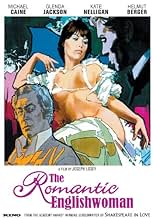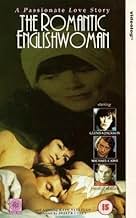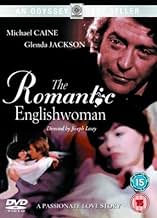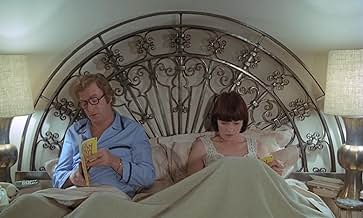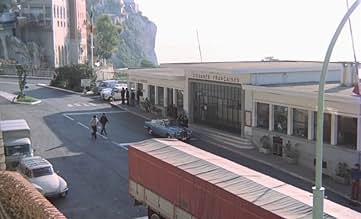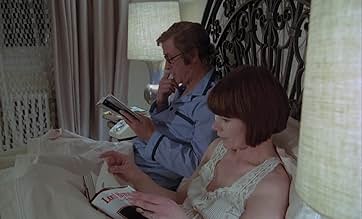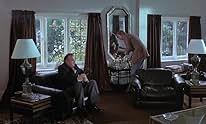CALIFICACIÓN DE IMDb
6.1/10
1.6 k
TU CALIFICACIÓN
Agrega una trama en tu idiomaA marriage crisis between a writer and his wife leads her to flee to Germany and eventually return with another man, through whom the writer is going to overcome his writer's block.A marriage crisis between a writer and his wife leads her to flee to Germany and eventually return with another man, through whom the writer is going to overcome his writer's block.A marriage crisis between a writer and his wife leads her to flee to Germany and eventually return with another man, through whom the writer is going to overcome his writer's block.
- Dirección
- Guionistas
- Elenco
Michael Lonsdale
- Swan
- (as Michel Lonsdale)
Béatrice Romand
- Catherine
- (as Beatrice Romand)
Reinhard Kolldehoff
- Herman
- (as Rene Kolldehoff)
Opiniones destacadas
Glenda Jackson decides to get away for a few days from husband, successful writer Michael Caine and heads to Baden Baden where she succumbs to the charms of mysterious Helmut Berger. Unbeknownst to Jackson, Berger's character contacts Michael Caine and comes to stay with them as Caine's secretary, but he is clearly running away from something.
One of those films with an incredible pedigree - Caine and Jackson, writer Tom Stoppard and sixties director giant Joseph Losey (The Go-Between, The Servant). But whilst there is quality at work here with a sometimes witty and clever script, this doesn't really coalesce into a wholly convincing story. The 2 leads are excellent with Caine often very funny, but the witty marriage in crisis element is rather overshadowed by the man on the run story which doesn't really fit with the rest of the material. Plenty to enjoy though and in some way underrated and worth catching, just manage your expectations.
One of those films with an incredible pedigree - Caine and Jackson, writer Tom Stoppard and sixties director giant Joseph Losey (The Go-Between, The Servant). But whilst there is quality at work here with a sometimes witty and clever script, this doesn't really coalesce into a wholly convincing story. The 2 leads are excellent with Caine often very funny, but the witty marriage in crisis element is rather overshadowed by the man on the run story which doesn't really fit with the rest of the material. Plenty to enjoy though and in some way underrated and worth catching, just manage your expectations.
The Romantic Englishwoman did hold my attention with its opulent settings and actors of stature, Michael Caine and Glenda Jackson, but the story left me confused. In the movie, we see an English woman named Elizabeth on holiday in Germany at a hotel resort in Baden-Baden, where she has a brief liaison with a handsome European named Thomas played by Helmut Burger. Elizabeth is an elegantly dressed and beautiful woman played by Glenda Jackson, who is married to a successful writer named Lewis Fielding, played by Michael Caine. On Elizabeth's return to England, her husband becomes aware of her friend and invites him to tea at their family home in England. Much of what follows seems to be orchestrated by Lewis who is seeking material for his novel. The extent of the "affair" between Elizabeth and Thomas is difficult to judge since they seemed to barely get to know one another, except for a quick sexual encounter in an elevator. Burger, as the Thomas character, maintains an air of mystery while in Germany and later in England as he becomes an assistant to Caine's character Lewis, doing typing and other secretarial work, and letting the nanny become infatuated with him. It seems that he has no real line of work although he purports to be a poet. Instead, he is a gigolo who consorts with underworld figures and is a skillful thief snatching another guest's overcoat, or removing in-room meals for hotel guests. The relationship between Elizabeth and Thomas seems to blossom as a full affair when they return to Europe, this time in Monaco. Thomas continues to be followed by underworld characters while sharing the affections of wealthy women. Burger lacks the acting persona to play alongside Jackson and Caine. Kate Nelligan and Michael Lonsdale are in the cast; however, their roles amount to little. Beautiful settings aside, the acting of Jackson and Caine cannot rescue this story, whatever the story is.
Spa towns seem to have an odd effect on film-makers. Alain Resnais' "Last year in Marienbad", set in the Czech spa town of that name, has a reputation for being bafflingly obscure, so much so that it won itself a place in Michael and Harry Medved's "Fifty Worst Films of All Time". And then there is Joseph Losey's "The Romantic Englishwoman", part of which is set in the German spa town of Baden Baden.
The plot concerns Elizabeth, the "romantic Englishwoman" of the title and the wife of a well-known novelist. While staying in Baden Baden Elizabeth has an affair with a young German named Thomas. Or does she? Is it possible that this "affair" was simply a fantasy on her part? Or does it only exist in the mind of her jealous husband Lewis? Thomas, an admirer of Lewis' work, later comes to stay with Lewis and Elizabeth at their home in England, where Lewis makes him surprisingly welcome for a man who is (or whom he believes to be) his wife's lover. There is also a sub-plot about Thomas' criminal associates, led by a man named Swan, who are pursuing him across Europe, but the exact details remain vague.
There is an adage that one should never judge a book by its cover, and the cinematic equivalent would probably be "don't judge a film by the big names in its title sequence". Even if you have admired the other work of those names. Michael Caine (now Sir Michael) is one of the cinema's greatest stars, appearing in some of the best British films of the sixties, seventies and eighties such as "Alfie", "Get Carter" and "Educating Rita". Glenda Jackson is today best known as a Labour politician, but was a fine actress in her youth. Scriptwriter Tom Stoppard is perhaps Britain's greatest living playwright. Losey was best known to me as the director of "The Go-Between", one of the major British films of the early seventies and one of the films which started the "heritage cinema" movement.
Unfortunately, all this assembled talent does not make for a good film. "The Romantic Englishwoman" goes to show that baffling obscurity was not a monopoly of the Nouvelle Vague and that British art-house film-makers could be just as infuriatingly obscure as their French counterparts. (Losey was American by birth, but I count him as an honorary Briton. He was forced to leave Hollywood during the McCarthy era because of his left-wing sympathies and thereafter worked mostly in Britain). I would not quite count this among my all-time fifty worst films, but it is nevertheless a dull and confusing one which not only lacks a clear storyline but also lacks any perceptible point. There are some films where ambiguity can be a positive virtue rather than a fault, but this is not one of them. 4/10
The plot concerns Elizabeth, the "romantic Englishwoman" of the title and the wife of a well-known novelist. While staying in Baden Baden Elizabeth has an affair with a young German named Thomas. Or does she? Is it possible that this "affair" was simply a fantasy on her part? Or does it only exist in the mind of her jealous husband Lewis? Thomas, an admirer of Lewis' work, later comes to stay with Lewis and Elizabeth at their home in England, where Lewis makes him surprisingly welcome for a man who is (or whom he believes to be) his wife's lover. There is also a sub-plot about Thomas' criminal associates, led by a man named Swan, who are pursuing him across Europe, but the exact details remain vague.
There is an adage that one should never judge a book by its cover, and the cinematic equivalent would probably be "don't judge a film by the big names in its title sequence". Even if you have admired the other work of those names. Michael Caine (now Sir Michael) is one of the cinema's greatest stars, appearing in some of the best British films of the sixties, seventies and eighties such as "Alfie", "Get Carter" and "Educating Rita". Glenda Jackson is today best known as a Labour politician, but was a fine actress in her youth. Scriptwriter Tom Stoppard is perhaps Britain's greatest living playwright. Losey was best known to me as the director of "The Go-Between", one of the major British films of the early seventies and one of the films which started the "heritage cinema" movement.
Unfortunately, all this assembled talent does not make for a good film. "The Romantic Englishwoman" goes to show that baffling obscurity was not a monopoly of the Nouvelle Vague and that British art-house film-makers could be just as infuriatingly obscure as their French counterparts. (Losey was American by birth, but I count him as an honorary Briton. He was forced to leave Hollywood during the McCarthy era because of his left-wing sympathies and thereafter worked mostly in Britain). I would not quite count this among my all-time fifty worst films, but it is nevertheless a dull and confusing one which not only lacks a clear storyline but also lacks any perceptible point. There are some films where ambiguity can be a positive virtue rather than a fault, but this is not one of them. 4/10
My very first contact with Joseph Losey's canon is this film adapted from Thomas Wiseman's eponymous novel, the reason why I selected this one purely because of its cast, namely for Glenda Jackson, the two-times Oscar winner, whose work has eluded me until now, but the film itself turns out to be a very disappointing misfire.
Speaking of the cast, Glenda Jackson has her charismatic dignity in almost every scene although regularly shoehorned between Berger's perpetual snug grin and Caine's perpetual sullen stare, and eventually cannot save the film from the mire of a psychological drama swamped with behavioral absurdities and non-consistent narrative. The fierce-looking wife with a bob cut and perfectly trimmed fringes, who is discontent with her middle-class lifestyle (her writer husband has immersed into the writer's block when writing a film script and becomes paranoid about her adultery in her solo trip to Baden-Baden), tries her luck to elope with a self-claimed German poet (whose real identity is only hinted by smuggling small-time drugs and cruising of elderly lonely-hearts), whom she has met before in Baden- Baden, but is there a fling between them in their previous encounter? The film never answer the question, a corny exploit being overused here.
Richard Harley's lyrical string score has stolen the thunder since more often than not, I am very much a visual observer than a sonic perfectionist. Also I quite prefer the slowly panning camera in carefully constructing a hunter and prey game in the beginning part in Baden- Baden to the dreadful and ostentatious meandering in the labyrinth of feigned sentimentality, claiming inane quips like "Englishwoman is the most romantic" (Berger's German accent is a major buzz-killer), I hope someone else could be fortunate enough to fully digest all the hocus-pocus and be grateful towards this ill-fated film adaption.
Speaking of the cast, Glenda Jackson has her charismatic dignity in almost every scene although regularly shoehorned between Berger's perpetual snug grin and Caine's perpetual sullen stare, and eventually cannot save the film from the mire of a psychological drama swamped with behavioral absurdities and non-consistent narrative. The fierce-looking wife with a bob cut and perfectly trimmed fringes, who is discontent with her middle-class lifestyle (her writer husband has immersed into the writer's block when writing a film script and becomes paranoid about her adultery in her solo trip to Baden-Baden), tries her luck to elope with a self-claimed German poet (whose real identity is only hinted by smuggling small-time drugs and cruising of elderly lonely-hearts), whom she has met before in Baden- Baden, but is there a fling between them in their previous encounter? The film never answer the question, a corny exploit being overused here.
Richard Harley's lyrical string score has stolen the thunder since more often than not, I am very much a visual observer than a sonic perfectionist. Also I quite prefer the slowly panning camera in carefully constructing a hunter and prey game in the beginning part in Baden- Baden to the dreadful and ostentatious meandering in the labyrinth of feigned sentimentality, claiming inane quips like "Englishwoman is the most romantic" (Berger's German accent is a major buzz-killer), I hope someone else could be fortunate enough to fully digest all the hocus-pocus and be grateful towards this ill-fated film adaption.
Glenda Jackson's frustrated bourgeois housewife, having gone to the spa town of Baden-Baden for unspecified reasons, maybe or maybe doesn't have a brief affair with Helmut Berger's young gigolo. In town on a botched drug deal, Berger operates through a combination of what we might term freelancing: as a car or drug smuggler but, it seems, principally as a gigolo whose opening line is that he's a "poet". Meanwhile, back in British suburbia, Jackson's husband, writer Michael Caine abandons plans to work on a novel to begin a screenplay based on his jealous imaginings of his wife's Baden-Baden sojourn. When Berger telephones Caine to announce that he's an admirer of his work and turns up (literally) "for tea", the stakes are set for the triangle to play out, with the added drama in the final third of Berger's drug connections, among them the poker-faced, and sadly under-used, Michael Lonsdale, turning up in a kind of lugubrious pursuit.
During the 1960s and 70s, Joseph Losey reinvented himself from a filmmaker of social problem pictures and taut, gritty noirs, to an arthouse director, with mixed results. In some cases-notably his collaborations with Harold Pinter, 'Accident' and 'The Go-Between'-formal innovations-particularly Alain Resnais-style temporal ambiguity-were closely allied to a dissection of the British class system. In others, such as the camp classics 'Boom!' or 'Secret Ceremony', it's not clear exactly *what's* going on-and not necessarily in a good way. Essentially, what we watch is a set of variations on a theme, more or less successfully rendered. Take the use of flashbacks and flashforwards: longer or shorter inserts of scenes whose relation to the main narrative is not immediately revealed, used particularly good effect in the late '60s/early '70s Pinter collaborations 'Accident' and 'The Go-Between'. In 'The Romantic Englishwoman', the flashbacks/forwards centre on an incident that occurs near the start of the film: the moment Jackson and Berger take a lift together in their hotel and may or may not initiate a sexual relationship. This incident is a way to explore the boundaries between action and desire, and various real or imaginary pairings of the heterosexual couple and a third partner. What happened in the lift in Baden-Baden? From whose perspective do we see this?
As the film goes on, though, not much done is to expand these initially intriguing ideas. The film couldn't easily be called either a feminist or an anti-feminist film: Caine's obnoxious outburst at Jackson's friend, a visiting gossip columnist, for repeating feminist statements about female homemaking roles, is clearly absurd, yet, like Jeanne Mourea's Eve, Jackson's dreams of liberation from marriage can occur only through another man, offering no real possibility of sociability outside the heterosexual contract. We thus simultaneously watch the playing out of male jealousy and of Jackson's "romantic" desire for escape--the doomed template of much melodrama. Too often, though, the film simply *presents* this double-bind, offering little other perspective on what we already know. The flashback-flashforward structure insists on the claustrophobic way in which its characters play out pre-ordained social roles, yet it has little to say *about* such roles, apart from telling us that they exist. The result: a film that ultimately feels "cold", dead, an exercise in style.
During the 1960s and 70s, Joseph Losey reinvented himself from a filmmaker of social problem pictures and taut, gritty noirs, to an arthouse director, with mixed results. In some cases-notably his collaborations with Harold Pinter, 'Accident' and 'The Go-Between'-formal innovations-particularly Alain Resnais-style temporal ambiguity-were closely allied to a dissection of the British class system. In others, such as the camp classics 'Boom!' or 'Secret Ceremony', it's not clear exactly *what's* going on-and not necessarily in a good way. Essentially, what we watch is a set of variations on a theme, more or less successfully rendered. Take the use of flashbacks and flashforwards: longer or shorter inserts of scenes whose relation to the main narrative is not immediately revealed, used particularly good effect in the late '60s/early '70s Pinter collaborations 'Accident' and 'The Go-Between'. In 'The Romantic Englishwoman', the flashbacks/forwards centre on an incident that occurs near the start of the film: the moment Jackson and Berger take a lift together in their hotel and may or may not initiate a sexual relationship. This incident is a way to explore the boundaries between action and desire, and various real or imaginary pairings of the heterosexual couple and a third partner. What happened in the lift in Baden-Baden? From whose perspective do we see this?
As the film goes on, though, not much done is to expand these initially intriguing ideas. The film couldn't easily be called either a feminist or an anti-feminist film: Caine's obnoxious outburst at Jackson's friend, a visiting gossip columnist, for repeating feminist statements about female homemaking roles, is clearly absurd, yet, like Jeanne Mourea's Eve, Jackson's dreams of liberation from marriage can occur only through another man, offering no real possibility of sociability outside the heterosexual contract. We thus simultaneously watch the playing out of male jealousy and of Jackson's "romantic" desire for escape--the doomed template of much melodrama. Too often, though, the film simply *presents* this double-bind, offering little other perspective on what we already know. The flashback-flashforward structure insists on the claustrophobic way in which its characters play out pre-ordained social roles, yet it has little to say *about* such roles, apart from telling us that they exist. The result: a film that ultimately feels "cold", dead, an exercise in style.
¿Sabías que…?
- TriviaSir Dirk Bogarde turned down the role of Lewis Fielding.
- ErroresWhen the Glenda Jackson character first arrives back from abroad and wanders around her home, the camera crew can be seen reflected in the glass of a picture on the wall.
- ConexionesFeatured in Premio Donostia a Michael Caine (2000)
Selecciones populares
Inicia sesión para calificar y agrega a la lista de videos para obtener recomendaciones personalizadas
- How long is The Romantic Englishwoman?Con tecnología de Alexa
Detalles
- Fecha de lanzamiento
- Países de origen
- Idiomas
- También se conoce como
- Die romantische Engländerin
- Locaciones de filmación
- Productoras
- Ver más créditos de la compañía en IMDbPro
Taquilla
- Presupuesto
- USD 1,200,000 (estimado)
- Tiempo de ejecución1 hora 56 minutos
- Mezcla de sonido
- Relación de aspecto
- 1.85 : 1
Contribuir a esta página
Sugiere una edición o agrega el contenido que falta



